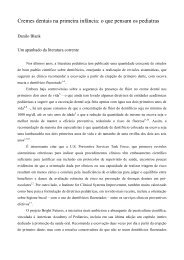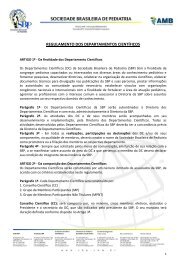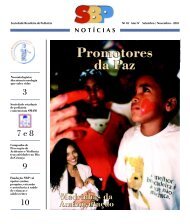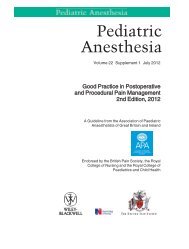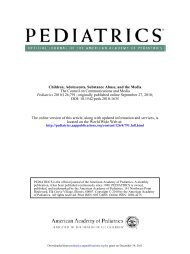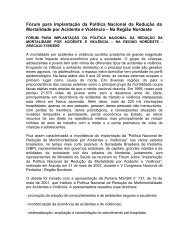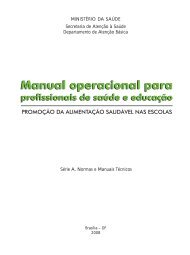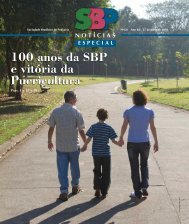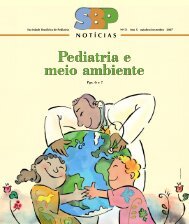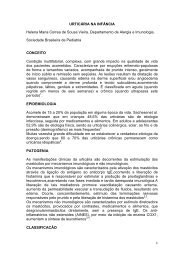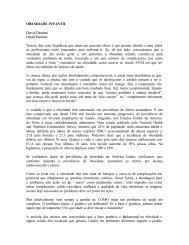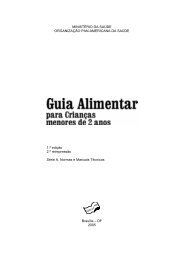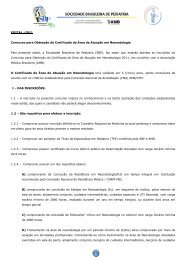- Page 2 and 3:
Medicines information servicesInfor
- Page 4 and 5:
Published byBMJ GroupTavistock Squa
- Page 6 and 7:
iv BNFC 2011-2012PrefaceBNF for Chi
- Page 8 and 9:
vi BNFC 2011-2012BNF StaffDigital D
- Page 10 and 11:
viii BNFC 2011-2012Nurse Prescriber
- Page 12 and 13:
x BNFC 2011-2012. incorporating the
- Page 14 and 15:
xii BNFC 2011-2012prescribing notes
- Page 16 and 17:
Branded oral liquid preparations th
- Page 18 and 19:
xvi BNFC 2011-2012Finding significa
- Page 20 and 21:
xviii BNFC 2011-2012Epilim Chronosp
- Page 22 and 23:
xx BNFC 2011-2012Tears Naturale c S
- Page 24 and 25:
2 General guidance BNFC 2011-2012Ge
- Page 26 and 27:
4 Prescription writing BNFC 2011-20
- Page 28 and 29:
6 Supply of medicines BNFC 2011-201
- Page 30 and 31:
8 Emergency supply of medicines BNF
- Page 32 and 33:
10 Prescribing Controlled Drugs BNF
- Page 34 and 35:
Adverse reactions to drugs12 Advers
- Page 36 and 37:
Prescribing in hepatic impairment14
- Page 38 and 39:
Prescribing in pregnancy16 Prescrib
- Page 40 and 41:
18 Prescribing in palliative care B
- Page 42 and 43:
20 Prescribing in palliative care B
- Page 44 and 45:
22 Prescribing in dental practice B
- Page 46 and 47:
Emergency treatment of poisoning24
- Page 48 and 49:
26 Emergency treatment of poisoning
- Page 50 and 51:
28 Emergency treatment of poisoning
- Page 52 and 53:
30 Emergency treatment of poisoning
- Page 54 and 55:
32 Emergency treatment of poisoning
- Page 56 and 57:
34 Emergency treatment of poisoning
- Page 58 and 59:
36 1.1.1 Antacids and simeticone BN
- Page 60 and 61:
38 1.1.2 Compound alginate preparat
- Page 62 and 63:
40 1.2 Antispasmodics and other dru
- Page 64 and 65:
42 1.3 Antisecretory drugs and muco
- Page 66 and 67:
44 1.3.3 Chelates and complexes BNF
- Page 68 and 69:
46 1.4 Acute diarrhoea BNFC 2011-20
- Page 70 and 71:
48 1.5 Chronic bowel disorders BNFC
- Page 72 and 73:
50 1.5.1 Aminosalicylates BNFC 2011
- Page 74 and 75:
52 1.5.1 Aminosalicylates BNFC 2011
- Page 76 and 77:
54 1.5.3 Drugs affecting the immune
- Page 78 and 79:
56 1.5.4 Food allergy BNFC 2011-201
- Page 80 and 81:
58 1.6.1 Bulk-forming laxatives BNF
- Page 82 and 83:
60 1.6.2 Stimulant laxatives BNFC 2
- Page 84 and 85:
62 1.6.4 Osmotic laxatives BNFC 201
- Page 86 and 87:
64 1.6.5 Bowel cleansing preparatio
- Page 88 and 89:
66 1.7 Local preparations for anal
- Page 90 and 91:
68 1.8 Stoma and enteral feeding tu
- Page 92 and 93:
70 1.9.2 Bile acid sequestrants BNF
- Page 94 and 95:
72 1.9.4 Pancreatin BNFC 2011-20121
- Page 96 and 97:
74 2.1.1 Cardiac glycosides BNFC 20
- Page 98 and 99:
76 2.2 Diuretics BNFC 2011-20122 Ca
- Page 100 and 101:
78 2.2.2 Loop diuretics BNFC 2011-2
- Page 103 and 104:
BNFC 2011-2012 2.2.4 Potassium-spar
- Page 105 and 106:
BNFC 2011-2012 2.3.2 Drugs for arrh
- Page 107 and 108:
BNFC 2011-2012 2.3.2 Drugs for arrh
- Page 109 and 110:
BNFC 2011-2012 2.4 Beta-adrenocepto
- Page 111 and 112:
BNFC 2011-2012 2.4 Beta-adrenocepto
- Page 113 and 114:
BNFC 2011-2012 2.4 Beta-adrenocepto
- Page 115 and 116:
BNFC 2011-2012 2.5.1 Vasodilator an
- Page 117 and 118:
BNFC 2011-2012 2.5.1 Vasodilator an
- Page 119 and 120:
BNFC 2011-2012 2.5.1 Vasodilator an
- Page 121 and 122:
BNFC 2011-2012 2.5.4 Alpha-adrenoce
- Page 123 and 124:
BNFC 2011-2012 2.5.5 Drugs affectin
- Page 125 and 126:
BNFC 2011-2012 2.5.5 Drugs affectin
- Page 127 and 128:
BNFC 2011-2012 2.6.2 Calcium-channe
- Page 129 and 130:
BNFC 2011-2012 2.6.2 Calcium-channe
- Page 131 and 132:
BNFC 2011-2012 2.6.2 Calcium-channe
- Page 133 and 134:
BNFC 2011-2012 2.7.1 Inotropic symp
- Page 135 and 136:
BNFC 2011-2012 2.7.2 Vasoconstricto
- Page 137 and 138:
BNFC 2011-2012 2.8.1 Parenteral ant
- Page 139 and 140:
BNFC 2011-2012 2.8.1 Parenteral ant
- Page 141 and 142:
BNFC 2011-2012 2.8.2 Oral anticoagu
- Page 143 and 144:
BNFC 2011-2012 2.10 Myocardial infa
- Page 145 and 146:
BNFC 2011-2012 2.11 Antifibrinolyti
- Page 147 and 148:
BNFC 2011-2012 2.12 Lipid-regulatin
- Page 149 and 150:
BNFC 2011-2012 2.12 Lipid-regulatin
- Page 151 and 152:
BNFC 2011-2012 2.12 Lipid-regulatin
- Page 153 and 154:
BNFC 2011-2012 2.14 Drugs affecting
- Page 155 and 156:
BNFC 2011-2012 1333 Respiratory sys
- Page 157 and 158:
BNFC 2011-2012 3.1 Bronchodilators
- Page 159 and 160:
BNFC 2011-2012 3.1.1 Adrenoceptor a
- Page 161 and 162:
BNFC 2011-2012 3.1.1 Adrenoceptor a
- Page 163 and 164:
BNFC 2011-2012 3.1.2 Antimuscarinic
- Page 165 and 166:
BNFC 2011-2012 3.1.3 Theophylline 1
- Page 167 and 168:
BNFC 2011-2012 3.1.5 Peak flow mete
- Page 169 and 170:
BNFC 2011-2012 3.2 Corticosteroids
- Page 171 and 172:
BNFC 2011-2012 3.2 Corticosteroids
- Page 173 and 174:
BNFC 2011-2012 3.3 Cromoglicate and
- Page 175 and 176:
BNFC 2011-2012 3.4 Antihistamines,
- Page 177 and 178:
BNFC 2011-2012 3.4.1 Antihistamines
- Page 179 and 180:
BNFC 2011-2012 3.4.2 Allergen immun
- Page 181 and 182:
BNFC 2011-2012 3.4.3 Allergic emerg
- Page 183 and 184:
BNFC 2011-2012 3.4.3 Allergic emerg
- Page 185 and 186:
BNFC 2011-2012 3.6 Oxygen 163ment
- Page 187 and 188:
BNFC 2011-2012 3.7 Mucolytics 165HO
- Page 189 and 190:
BNFC 2011-2012 3.9 Cough preparatio
- Page 191 and 192:
BNFC 2011-2012 1694 Central nervous
- Page 193 and 194:
BNFC 2011-2012 4.1.2 Anxiolytics 17
- Page 195 and 196:
BNFC 2011-2012 4.2.1 Antipsychotic
- Page 197 and 198:
BNFC 2011-2012 4.2.1 Antipsychotic
- Page 199 and 200:
BNFC 2011-2012 4.2.1 Antipsychotic
- Page 201 and 202:
BNFC 2011-2012 4.2.1 Antipsychotic
- Page 203 and 204:
BNFC 2011-2012 4.2.2 Antipsychotic
- Page 205 and 206:
BNFC 2011-2012 4.3 Antidepressant d
- Page 207 and 208:
BNFC 2011-2012 4.3.1 Tricyclic anti
- Page 209 and 210:
BNFC 2011-2012 4.3.3 Selective sero
- Page 211 and 212:
BNFC 2011-2012 4.4 CNS stimulants a
- Page 213 and 214:
BNFC 2011-2012 4.5 Drugs used in th
- Page 215 and 216:
BNFC 2011-2012 4.6 Drugs used in na
- Page 217 and 218:
BNFC 2011-2012 4.6 Drugs used in na
- Page 219 and 220:
BNFC 2011-2012 4.6 Drugs used in na
- Page 221 and 222:
BNFC 2011-2012 4.7 Analgesics 199Sc
- Page 223 and 224:
BNFC 2011-2012 4.7.1 Non-opioid ana
- Page 225 and 226:
BNFC 2011-2012 4.7.2 Opioid analges
- Page 227 and 228:
BNFC 2011-2012 4.7.2 Opioid analges
- Page 229 and 230:
BNFC 2011-2012 4.7.2 Opioid analges
- Page 231 and 232:
BNFC 2011-2012 4.7.2 Opioid analges
- Page 233 and 234:
BNFC 2011-2012 4.7.2 Opioid analges
- Page 235 and 236:
BNFC 2011-2012 4.7.4 Antimigraine d
- Page 237 and 238:
BNFC 2011-2012 4.8 Antiepileptics 2
- Page 239 and 240:
BNFC 2011-2012 4.8.1 Control of the
- Page 241 and 242:
BNFC 2011-2012 4.8.1 Control of the
- Page 243 and 244:
BNFC 2011-2012 4.8.1 Control of the
- Page 245 and 246:
BNFC 2011-2012 4.8.1 Control of the
- Page 247 and 248:
BNFC 2011-2012 4.8.1 Control of the
- Page 249 and 250:
BNFC 2011-2012 4.8.1 Control of the
- Page 251 and 252:
BNFC 2011-2012 4.8.1 Control of the
- Page 253 and 254:
BNFC 2011-2012 4.8.2 Drugs used in
- Page 255 and 256:
BNFC 2011-2012 4.8.2 Drugs used in
- Page 257 and 258:
BNFC 2011-2012 4.8.3 Febrile convul
- Page 259 and 260:
BNFC 2011-2012 4.9.2 Antimuscarinic
- Page 261 and 262:
BNFC 2011-2012 4.10.2 Nicotine depe
- Page 263 and 264:
BNFC 2011-2012 4.10.2 Nicotine depe
- Page 265 and 266:
BNFC 2011-2012 5.1 Antibacterial dr
- Page 267 and 268:
BNFC 2011-2012 5.1 Antibacterial dr
- Page 269 and 270:
BNFC 2011-2012 5.1 Antibacterial dr
- Page 271 and 272:
BNFC 2011-2012 5.1 Antibacterial dr
- Page 273 and 274:
BNFC 2011-2012 5.1 Antibacterial dr
- Page 275 and 276:
BNFC 2011-2012 5.1 Antibacterial dr
- Page 277 and 278:
BNFC 2011-2012 5.1 Antibacterial dr
- Page 279 and 280:
BNFC 2011-2012 5.1.1 Penicillins 25
- Page 281 and 282:
BNFC 2011-2012 5.1.1 Penicillins 25
- Page 283 and 284:
BNFC 2011-2012 5.1.1 Penicillins 26
- Page 285 and 286:
BNFC 2011-2012 5.1.1 Penicillins 26
- Page 287 and 288:
BNFC 2011-2012 5.1.1 Penicillins 26
- Page 289 and 290:
BNFC 2011-2012 5.1.2 Cephalosporins
- Page 291 and 292:
BNFC 2011-2012 5.1.2 Cephalosporins
- Page 293 and 294:
BNFC 2011-2012 5.1.2 Cephalosporins
- Page 295 and 296:
BNFC 2011-2012 5.1.2 Cephalosporins
- Page 297 and 298:
BNFC 2011-2012 5.1.3 Tetracyclines
- Page 299 and 300:
BNFC 2011-2012 5.1.4 Aminoglycoside
- Page 301 and 302:
BNFC 2011-2012 5.1.4 Aminoglycoside
- Page 303 and 304:
BNFC 2011-2012 5.1.5 Macrolides 281
- Page 305 and 306:
BNFC 2011-2012 5.1.6 Clindamycin 28
- Page 307 and 308:
BNFC 2011-2012 5.1.7 Some other ant
- Page 309 and 310:
BNFC 2011-2012 5.1.7 Some other ant
- Page 311 and 312:
BNFC 2011-2012 5.1.8 Sulfonamides a
- Page 313 and 314:
BNFC 2011-2012 5.1.9 Antituberculos
- Page 315 and 316:
BNFC 2011-2012 5.1.9 Antituberculos
- Page 317 and 318:
BNFC 2011-2012 5.1.11 Metronidazole
- Page 319 and 320:
BNFC 2011-2012 5.1.12 Quinolones 29
- Page 321 and 322:
BNFC 2011-2012 5.1.13 Urinary-tract
- Page 323 and 324:
BNFC 2011-2012 5.2.1 Triazole antif
- Page 325 and 326:
BNFC 2011-2012 5.2.1 Triazole antif
- Page 327 and 328:
BNFC 2011-2012 5.2.2 Imidazole anti
- Page 329 and 330:
BNFC 2011-2012 5.2.4 Echinocandin a
- Page 331 and 332:
BNFC 2011-2012 5.3 Antiviral drugs
- Page 333 and 334:
BNFC 2011-2012 5.3.1 HIV infection
- Page 335 and 336:
BNFC 2011-2012 5.3.1 HIV infection
- Page 337 and 338:
BNFC 2011-2012 5.3.1 HIV infection
- Page 339 and 340:
BNFC 2011-2012 5.3.1 HIV infection
- Page 341 and 342:
BNFC 2011-2012 5.3.1 HIV infection
- Page 343 and 344:
BNFC 2011-2012 5.3.2 Herpesvirus in
- Page 345 and 346:
BNFC 2011-2012 5.3.2 Herpesvirus in
- Page 347 and 348:
BNFC 2011-2012 5.3.3 Viral hepatiti
- Page 349 and 350:
BNFC 2011-2012 5.3.5 Respiratory sy
- Page 351 and 352:
BNFC 2011-2012 5.4 Antiprotozoal dr
- Page 353 and 354:
BNFC 2011-2012 5.4.1 Antimalarials
- Page 355 and 356:
BNFC 2011-2012 5.4.1 Antimalarials
- Page 357 and 358:
BNFC 2011-2012 5.4.1 Antimalarials
- Page 359 and 360:
BNFC 2011-2012 5.4.1 Antimalarials
- Page 361 and 362:
BNFC 2011-2012 5.4.2 Amoebicides 33
- Page 363 and 364:
BNFC 2011-2012 5.4.6 Trypanocides 3
- Page 365 and 366:
BNFC 2011-2012 5.4.8 Drugs for pneu
- Page 367 and 368:
BNFC 2011-2012 5.5.2 Ascaricides 34
- Page 369 and 370:
BNFC 2011-2012 5.5.8 Drugs for stro
- Page 371 and 372:
BNFC 2011-2012 6.1.1 Insulins 349Tr
- Page 373 and 374:
BNFC 2011-2012 6.1.1 Insulins 351So
- Page 375 and 376:
BNFC 2011-2012 6.1.1 Insulins 353IN
- Page 377 and 378:
BNFC 2011-2012 6.1.1 Insulins 355Hi
- Page 379 and 380:
BNFC 2011-2012 6.1.2 Antidiabetic d
- Page 381 and 382:
BNFC 2011-2012 6.1.2 Antidiabetic d
- Page 383 and 384:
BNFC 2011-2012 6.1.4 Treatment of h
- Page 385 and 386:
BNFC 2011-2012 6.1.6 Diagnostic and
- Page 387 and 388:
BNFC 2011-2012 6.2 Thyroid and anti
- Page 389 and 390:
BNFC 2011-2012 6.2.2 Antithyroid dr
- Page 391 and 392:
BNFC 2011-2012 6.3 Corticosteroids
- Page 393 and 394:
BNFC 2011-2012 6.3.2 Glucocorticoid
- Page 395 and 396:
BNFC 2011-2012 6.3.2 Glucocorticoid
- Page 397 and 398:
BNFC 2011-2012 6.3.2 Glucocorticoid
- Page 399 and 400:
BNFC 2011-2012 6.4 Sex hormones 377
- Page 401 and 402:
BNFC 2011-2012 6.4.2 Male sex hormo
- Page 403 and 404:
BNFC 2011-2012 6.4.3 Anabolic stero
- Page 405 and 406:
BNFC 2011-2012 6.5.1 Hypothalamic a
- Page 407 and 408:
BNFC 2011-2012 6.5.2 Posterior pitu
- Page 409 and 410:
BNFC 2011-2012 6.5.2 Posterior pitu
- Page 411 and 412:
BNFC 2011-2012 6.6.2 Bisphosphonate
- Page 413 and 414:
BNFC 2011-2012 6.7.3 Metyrapone 391
- Page 415 and 416:
BNFC 2011-2012 3937 Obstetrics, gyn
- Page 417 and 418:
BNFC 2011-2012 7.2.2 Vaginal and vu
- Page 419 and 420:
BNFC 2011-2012 7.3.1 Combined hormo
- Page 421 and 422:
BNFC 2011-2012 7.3.1 Combined hormo
- Page 423 and 424:
BNFC 2011-2012 7.3.1 Combined hormo
- Page 425 and 426:
BNFC 2011-2012 7.3.2 Progestogen-on
- Page 427 and 428:
BNFC 2011-2012 7.3.2 Progestogen-on
- Page 429 and 430:
BNFC 2011-2012 7.3.4 Contraceptive
- Page 431 and 432:
BNFC 2011-2012 7.4 Drugs for genito
- Page 433 and 434:
BNFC 2011-2012 7.4.2 Drugs for urin
- Page 435 and 436:
BNFC 2011-2012 7.4.5 Drugs for erec
- Page 437 and 438:
BNFC 2011-2012 8.1 Cytotoxic drugs
- Page 439 and 440:
BNFC 2011-2012 8.1 Cytotoxic drugs
- Page 441 and 442:
BNFC 2011-2012 8.1.1 Alkylating dru
- Page 443 and 444:
BNFC 2011-2012 8.1.2 Cytotoxic anti
- Page 445 and 446:
BNFC 2011-2012 8.1.3 Antimetabolite
- Page 447 and 448:
BNFC 2011-2012 8.1.3 Antimetabolite
- Page 449 and 450:
BNFC 2011-2012 8.1.5 Other antineop
- Page 451 and 452:
BNFC 2011-2012 8.1.5 Other antineop
- Page 453 and 454:
BNFC 2011-2012 8.2 Drugs affecting
- Page 455 and 456:
BNFC 2011-2012 8.2.2 Corticosteroid
- Page 457 and 458:
BNFC 2011-2012 8.2.2 Corticosteroid
- Page 459 and 460:
BNFC 2011-2012 8.2.2 Corticosteroid
- Page 461 and 462:
BNFC 2011-2012 8.2.4 Other immunomo
- Page 463 and 464:
BNFC 2011-2012 8.2.4 Other immunomo
- Page 465 and 466:
BNFC 2011-2012 9.1.1 Iron-deficienc
- Page 467 and 468:
BNFC 2011-2012 9.1.2 Drugs used in
- Page 469 and 470:
BNFC 2011-2012 9.1.3 Drugs used in
- Page 471 and 472:
BNFC 2011-2012 9.1.3 Drugs used in
- Page 473 and 474:
BNFC 2011-2012 9.1.3 Drugs used in
- Page 475 and 476:
BNFC 2011-2012 9.1.4 Drugs used in
- Page 477 and 478:
BNFC 2011-2012 9.1.6 Drugs used in
- Page 479 and 480:
BNFC 2011-2012 9.2.1 Oral preparati
- Page 481 and 482:
BNFC 2011-2012 9.2.1 Oral preparati
- Page 483 and 484:
BNFC 2011-2012 9.2.2 Parenteral pre
- Page 485 and 486:
BNFC 2011-2012 9.2.2 Parenteral pre
- Page 487 and 488:
BNFC 2011-2012 9.2.2 Parenteral pre
- Page 489 and 490:
BNFC 2011-2012 9.3 Intravenous nutr
- Page 491 and 492:
BNFC 2011-2012 9.4.2 Enteral nutrit
- Page 493 and 494:
BNFC 2011-2012 9.5 Minerals 471dren
- Page 495 and 496:
BNFC 2011-2012 9.5.1 Calcium and ma
- Page 497 and 498:
BNFC 2011-2012 9.5.2 Phosphorus 475
- Page 499 and 500:
BNFC 2011-2012 9.5.3 Fluoride 477Ch
- Page 501 and 502:
BNFC 2011-2012 9.6.2 Vitamin B grou
- Page 503 and 504:
BNFC 2011-2012 9.6.3 Vitamin C 481I
- Page 505 and 506:
BNFC 2011-2012 9.6.4 Vitamin D 483N
- Page 507 and 508:
BNFC 2011-2012 9.6.5 Vitamin E 4851
- Page 509 and 510:
BNFC 2011-2012 9.6.7 Multivitamin p
- Page 511 and 512:
BNFC 2011-2012 9.8.1 Drugs used in
- Page 513 and 514:
BNFC 2011-2012 9.8.1 Drugs used in
- Page 515 and 516:
BNFC 2011-2012 9.8.1 Drugs used in
- Page 517 and 518:
BNFC 2011-2012 9.8.1 Drugs used in
- Page 519 and 520:
BNFC 2011-2012 9.8.2 Acute porphyri
- Page 521 and 522:
BNFC 2011-2012 49910 Musculoskeleta
- Page 523 and 524:
BNFC 2011-2012 10.1.1 Non-steroidal
- Page 525 and 526:
BNFC 2011-2012 10.1.1 Non-steroidal
- Page 527 and 528:
BNFC 2011-2012 10.1.1 Non-steroidal
- Page 529 and 530:
BNFC 2011-2012 10.1.3 Drugs that su
- Page 531 and 532:
BNFC 2011-2012 10.1.3 Drugs that su
- Page 533 and 534:
BNFC 2011-2012 10.1.4 Gout and cyto
- Page 535 and 536:
BNFC 2011-2012 10.2.2 Skeletal musc
- Page 537 and 538:
BNFC 2011-2012 10.2.2 Skeletal musc
- Page 539 and 540:
BNFC 2011-2012 51711 Eye11.1 Admini
- Page 541 and 542:
BNFC 2011-2012 11.3.1 Antibacterial
- Page 543 and 544:
BNFC 2011-2012 11.3.3 Antivirals 52
- Page 545 and 546:
BNFC 2011-2012 11.4.2 Other anti-in
- Page 547 and 548:
BNFC 2011-2012 11.6 Treatment of gl
- Page 549 and 550:
BNFC 2011-2012 11.6 Treatment of gl
- Page 551 and 552:
BNFC 2011-2012 11.7 Local anaesthet
- Page 553 and 554:
BNFC 2011-2012 11.8.1 Tear deficien
- Page 555 and 556:
BNFC 2011-2012 11.9 Contact lenses
- Page 557 and 558:
BNFC 2011-2012 12.1.1 Otitis extern
- Page 559 and 560:
BNFC 2011-2012 12.1.2 Otitis media
- Page 561 and 562:
BNFC 2011-2012 12.2.1 Drugs used in
- Page 563 and 564:
BNFC 2011-2012 12.2.2 Topical nasal
- Page 565 and 566:
BNFC 2011-2012 12.3 Drugs acting on
- Page 567 and 568:
BNFC 2011-2012 12.3.2 Oropharyngeal
- Page 569 and 570:
BNFC 2011-2012 12.3.4 Mouthwashes a
- Page 571 and 572:
BNFC 2011-2012 12.3.5 Treatment of
- Page 573 and 574: BNFC 2011-2012 13.1.1 Vehicles 551m
- Page 575 and 576: BNFC 2011-2012 13.2.1 Emollients 55
- Page 577 and 578: BNFC 2011-2012 13.2.1 Emollients 55
- Page 579 and 580: BNFC 2011-2012 13.3 Topical antipru
- Page 581 and 582: BNFC 2011-2012 13.4 Topical cortico
- Page 583 and 584: BNFC 2011-2012 13.4 Topical cortico
- Page 585 and 586: BNFC 2011-2012 13.4 Topical cortico
- Page 587 and 588: BNFC 2011-2012 13.5 Preparations fo
- Page 589 and 590: BNFC 2011-2012 13.5.2 Preparations
- Page 591 and 592: BNFC 2011-2012 13.5.2 Preparations
- Page 593 and 594: BNFC 2011-2012 13.5.2 Preparations
- Page 595 and 596: BNFC 2011-2012 13.5.3 Drugs affecti
- Page 597 and 598: BNFC 2011-2012 13.6.1 Topical prepa
- Page 599 and 600: BNFC 2011-2012 13.6.1 Topical prepa
- Page 601 and 602: BNFC 2011-2012 13.6.2 Oral preparat
- Page 603 and 604: BNFC 2011-2012 13.7 Preparations fo
- Page 605 and 606: BNFC 2011-2012 13.8.2 Camouflagers
- Page 607 and 608: BNFC 2011-2012 13.10 Anti-infective
- Page 609 and 610: BNFC 2011-2012 13.10.1 Antibacteria
- Page 611 and 612: BNFC 2011-2012 13.10.2 Antifungal p
- Page 613 and 614: BNFC 2011-2012 13.10.3 Antiviral pr
- Page 615 and 616: BNFC 2011-2012 13.10.5 Preparations
- Page 617 and 618: BNFC 2011-2012 13.11.2 Chlorhexidin
- Page 619 and 620: BNFC 2011-2012 13.12 Antiperspirant
- Page 621 and 622: BNFC 2011-2012 59914 Immunological
- Page 623: BNFC 2011-2012 14.1 Active immunity
- Page 627 and 628: BNFC 2011-2012 14.4 Vaccines and an
- Page 629 and 630: BNFC 2011-2012 14.4 Vaccines and an
- Page 631 and 632: BNFC 2011-2012 14.4 Vaccines and an
- Page 633 and 634: BNFC 2011-2012 14.4 Vaccines and an
- Page 635 and 636: BNFC 2011-2012 14.4 Vaccines and an
- Page 637 and 638: BNFC 2011-2012 14.4 Vaccines and an
- Page 639 and 640: BNFC 2011-2012 14.4 Vaccines and an
- Page 641 and 642: BNFC 2011-2012 14.4 Vaccines and an
- Page 643 and 644: BNFC 2011-2012 14.4 Vaccines and an
- Page 645 and 646: BNFC 2011-2012 14.5.1 Normal Immuno
- Page 647 and 648: BNFC 2011-2012 14.5.2 Disease-speci
- Page 649 and 650: BNFC 2011-2012 14.6 International t
- Page 651 and 652: BNFC 2011-2012 15.1.1 Intravenous a
- Page 653 and 654: BNFC 2011-2012 15.1.1 Intravenous a
- Page 655 and 656: BNFC 2011-2012 15.1.2 Inhalational
- Page 657 and 658: BNFC 2011-2012 15.1.3 Antimuscarini
- Page 659 and 660: BNFC 2011-2012 15.1.4 Sedative and
- Page 661 and 662: BNFC 2011-2012 15.1.4 Sedative and
- Page 663 and 664: BNFC 2011-2012 15.1.4 Sedative and
- Page 665 and 666: BNFC 2011-2012 15.1.5 Neuromuscular
- Page 667 and 668: BNFC 2011-2012 15.1.5 Neuromuscular
- Page 669 and 670: BNFC 2011-2012 15.1.7 Antagonists f
- Page 671 and 672: BNFC 2011-2012 15.2 Local anaesthes
- Page 673 and 674: BNFC 2011-2012 15.2 Local anaesthes
- Page 675 and 676:
BNFC 2011-2012 15.2 Local anaesthes
- Page 677 and 678:
BNFC 2011-2012 655A1InteractionsTwo
- Page 679 and 680:
BNFC 2011-2012 Appendix 1: Interact
- Page 681 and 682:
BNFC 2011-2012 Appendix 1: Interact
- Page 683 and 684:
BNFC 2011-2012 Appendix 1: Interact
- Page 685 and 686:
BNFC 2011-2012 Appendix 1: Interact
- Page 687 and 688:
BNFC 2011-2012 Appendix 1: Interact
- Page 689 and 690:
BNFC 2011-2012 Appendix 1: Interact
- Page 691 and 692:
BNFC 2011-2012 Appendix 1: Interact
- Page 693 and 694:
BNFC 2011-2012 Appendix 1: Interact
- Page 695 and 696:
BNFC 2011-2012 Appendix 1: Interact
- Page 697 and 698:
BNFC 2011-2012 Appendix 1: Interact
- Page 699 and 700:
BNFC 2011-2012 Appendix 1: Interact
- Page 701 and 702:
BNFC 2011-2012 Appendix 1: Interact
- Page 703 and 704:
BNFC 2011-2012 Appendix 1: Interact
- Page 705 and 706:
BNFC 2011-2012 Appendix 1: Interact
- Page 707 and 708:
BNFC 2011-2012 Appendix 1: Interact
- Page 709 and 710:
BNFC 2011-2012 Appendix 1: Interact
- Page 711 and 712:
BNFC 2011-2012 Appendix 1: Interact
- Page 713 and 714:
BNFC 2011-2012 Appendix 1: Interact
- Page 715 and 716:
BNFC 2011-2012 Appendix 1: Interact
- Page 717 and 718:
BNFC 2011-2012 Appendix 1: Interact
- Page 719 and 720:
BNFC 2011-2012 Appendix 1: Interact
- Page 721 and 722:
BNFC 2011-2012 Appendix 1: Interact
- Page 723 and 724:
BNFC 2011-2012 Appendix 1: Interact
- Page 725 and 726:
BNFC 2011-2012 Appendix 1: Interact
- Page 727 and 728:
BNFC 2011-2012 Appendix 1: Interact
- Page 729 and 730:
BNFC 2011-2012 Appendix 1: Interact
- Page 731 and 732:
BNFC 2011-2012 Appendix 1: Interact
- Page 733 and 734:
BNFC 2011-2012 Appendix 1: Interact
- Page 735 and 736:
BNFC 2011-2012 Appendix 1: Interact
- Page 737 and 738:
BNFC 2011-2012 Appendix 1: Interact
- Page 739 and 740:
BNFC 2011-2012 Appendix 1: Interact
- Page 741 and 742:
BNFC 2011-2012 Appendix 1: Interact
- Page 743 and 744:
BNFC 2011-2012 Appendix 1: Interact
- Page 745 and 746:
BNFC 2011-2012 Appendix 1: Interact
- Page 747 and 748:
BNFC 2011-2012 Appendix 1: Interact
- Page 749 and 750:
BNFC 2011-2012 Appendix 1: Interact
- Page 751 and 752:
BNFC 2011-2012 Appendix 1: Interact
- Page 753 and 754:
BNFC 2011-2012 Appendix 1: Interact
- Page 755 and 756:
BNFC 2011-2012 Appendix 1: Interact
- Page 757 and 758:
BNFC 2011-2012 Appendix 1: Interact
- Page 759 and 760:
BNFC 2011-2012 Appendix 1: Interact
- Page 761 and 762:
BNFC 2011-2012 Appendix 1: Interact
- Page 763 and 764:
BNFC 2011-2012 Appendix 1: Interact
- Page 765 and 766:
BNFC 2011-2012 743A2Borderline subs
- Page 767 and 768:
Nutrison c(Nutricia Clinical)Nutris
- Page 769 and 770:
A2.1.2 Enteral feeds (non-disease s
- Page 771 and 772:
A2.1.2.2 Enteral feeds: Less than 1
- Page 773 and 774:
A2.1.3 Enteral feeds (non-disease s
- Page 775 and 776:
Infatrini c(Nutricia Clinical)Nutri
- Page 777 and 778:
Frebini c EnergyDrink(Fresenius Kab
- Page 779 and 780:
A2.2.1.2 Nutritional supplements: M
- Page 781 and 782:
Fortisip c Range(Nutricia Clinical)
- Page 783 and 784:
Forticreme cComplete(Nutricia Clini
- Page 785 and 786:
A2.3 Specialised formulasA2.3.1 Spe
- Page 787 and 788:
Nutramigen c Lipil 2(Mead Johnson)S
- Page 789 and 790:
Specialised formulas: Infant and ch
- Page 791 and 792:
KetoCal c(SHS)Standard dilution(20
- Page 793 and 794:
A2.4 Feed supplementsA2.4.1 High-en
- Page 795 and 796:
Medium-chainTriglyceride (MCT)Oil(S
- Page 797 and 798:
Calshake c(Fresenius Kabi)Powderper
- Page 799 and 800:
BNFC 2011-2012 A2.5 Feed additives
- Page 801 and 802:
BNFC 2011-2012 A2.6.1 Gluten-free f
- Page 803 and 804:
BNFC 2011-2012 A2.7 Nutritional sup
- Page 805 and 806:
BNFC 2011-2012 A2.7 Nutritional sup
- Page 807 and 808:
BNFC 2011-2012 A2.7 Nutritional sup
- Page 809 and 810:
BNFC 2011-2012 A2.7 Nutritional sup
- Page 811 and 812:
BNFC 2011-2012 Appendix 3: Cautiona
- Page 813 and 814:
BNFC 2011-2012 791A4Intravenous inf
- Page 815 and 816:
BNFC 2011-2012 Appendix 4: Intraven
- Page 817 and 818:
BNFC 2011-2012 Dental Practitioners
- Page 819 and 820:
BNFC 2011-2012 Nurse Prescribers’
- Page 821 and 822:
BNFC 2011-2012 799Non-medical presc
- Page 823 and 824:
BNFC 2011-2012 Index of manufacture
- Page 825 and 826:
BNFC 2011-2012 Index of manufacture
- Page 827 and 828:
BNFC 2011-2012 Index of manufacture
- Page 829 and 830:
BNFC 2011-2012 Index of manufacture
- Page 831 and 832:
BNFC 2011-2012 809Special-orderManu
- Page 833 and 834:
BNFC 2011-2012 Abacavir—Alfacalci
- Page 835 and 836:
BNFC 2011-2012 Anthelios—Arthrofe
- Page 837 and 838:
BNFC 2011-2012 Benzodiazepines—Bu
- Page 839 and 840:
BNFC 2011-2012 Cetrimide—Cocaine
- Page 841 and 842:
BNFC 2011-2012 Coumarins—Dermatop
- Page 843 and 844:
BNFC 2011-2012 Disinfectants—Emer
- Page 845 and 846:
BNFC 2011-2012 Eye—Formaldehyde 8
- Page 847 and 848:
BNFC 2011-2012 Glycogen—Homatropi
- Page 849 and 850:
BNFC 2011-2012 Ibuprofen—Iodide 8
- Page 851 and 852:
BNFC 2011-2012 Laxatives—Magnesiu
- Page 853 and 854:
BNFC 2011-2012 Methylenedioxymetham
- Page 855 and 856:
BNFC 2011-2012 Nicardipine—Oftaqu
- Page 857 and 858:
BNFC 2011-2012 Paramax—Plaquenil
- Page 859 and 860:
BNFC 2011-2012 Procarbazine—Regul
- Page 861 and 862:
BNFC 2011-2012 Scottish—Sodium 83
- Page 863 and 864:
BNFC 2011-2012 Syringes—Tocophero
- Page 865 and 866:
BNFC 2011-2012 Ursofalk—Waxsol 84
- Page 869 and 870:
NEWBORN LIFE SUPPORTDry the babyRem
- Page 871 and 872:
PAEDIATRIC ADVANCED LIFE SUPPORTUnr
- Page 873 and 874:
BODY SURFACE AREA IN CHILDRENBody-w
- Page 875 and 876:
Croup(section 3.1)Dexamethasone ora
- Page 877 and 878:
Recommended wording of cautionaryan



